|
|
|
Sort Order |
|
|
|
Items / Page
|
|
|
|
|
|
|
| Srl | Item |
| 1 |
ID:
112770
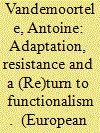

|
|
|
|
|
| Publication |
2012.
|
| Summary/Abstract |
This article analyzes the police restructuring process in Bosnia, and more specifically the role of the European Union in this process, to understand what, and how, different practices, routines and patterns of resistance influenced the timing, direction and outcome of this reform process. It provides a new angle to understand the final outcome of police restructuring by looking at actors' preferences, positions within the field of Security Sector Reform (SSR) and their strategies. The main argument is that a process of 'muddling through' was created by the combination of adaptation and resistance techniques employed by international, European and local actors in the broader police reform dynamics. By empirically demonstrating how and why specific practices of key actors influenced the policy-making process, this article provides a preliminary framework to reassess SSR activities as part of a field of practice, to be analyzed through a sociological lens.
|
|
|
|
|
|
|
|
|
|
|
|
|
|
|
|
| 2 |
ID:
140085
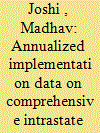

|
|
|
|
|
| Summary/Abstract |
This article introduces the Peace Accords Matrix Implementation Dataset (PAM_ID). We present time-series data on the implementation of 51 provisions in 34 comprehensive peace agreements negotiated in civil wars since 1989. We follow the implementation process for up to ten years following the signing of each agreement. The data provide new insights into the types of provisions that are more or less likely to be implemented, how implementation processes unfold over time, how implementation processes relate to one another, and how implementation affects various post-accord outcomes. We outline our coding methodology and case selection, and examine descriptive statistics. We illustrate one potential use of the data by combining eight different provisions into a composite indicator of security sector reform (SSR). A survival analysis finds that implementing security sector reforms contributes to long-term conflict reduction not only between the parties to the accord but also between the government and other non-signatory groups in the same conflict.
|
|
|
|
|
|
|
|
|
|
|
|
|
|
|
|
| 3 |
ID:
113212
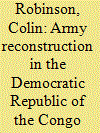

|
|
|
|
|
| Publication |
2012.
|
| Summary/Abstract |
Since the peace agreements of 2002-2003 which ended the second war in the Democratic Republic of Congo, reconstruction of the army has been an inherently political process, in common with other attempts to carry out security sector reform (SSR). This article briefly sketches out the Congolese army's history, then attempts to fill a gap in the literature on Congolese SSR by detailing what can be found of the actual structure and shape of the present army. The efforts that have been made to reform the army are then examined, followed by a conclusion which examines the major issues and possible ways forward.
|
|
|
|
|
|
|
|
|
|
|
|
|
|
|
|
| 4 |
ID:
112768


|
|
|
|
|
| Publication |
2012.
|
| Summary/Abstract |
This article provides a theoretically informed analysis to understand why and how security sector reform (SSR) norms have been integrated into the European Union (EU) security architecture. It investigates the role of epistemic communities in advancing the security-development/good governance agenda underpinning SSR and in fostering institutional learning. Shared knowledge and expertise have driven policy and institutional change, since they yielded a new policy consensus that transformed the EU's approach to security in the post-cold war international system. Empirical findings, based on content analysis and on 25+ semi-structured interviews, suggest that transnational expertise-based networks did play a leading role in shaping SSR conceptual development. However, they also show that cleavages between epistemic communities across the security/development dividing line are ultimately responsible for the EU's failure to achieve a coherent SSR policy implementation. Moreover, the article concludes that the institutionalisation of SSR in the EU did not originate in a single norm setter, nor in sheer ideational stimulus. Change occurred through the complex interplay between ideas and interests, that is between knowledge and power, leading specific norms to be visualised as consensual and dominant.
|
|
|
|
|
|
|
|
|
|
|
|
|
|
|
|
| 5 |
ID:
166785


|
|
|
|
|
| Summary/Abstract |
Brazil’s role in UN peacekeeping operations has been subject to increasing attention from academics and policy makers alike. While some authors praise Brazil’s engagement in the United Nations Stabilization Mission in Haiti (MINUSTAH) as a case of innovative South-South cooperation, others accuse Brazil of using Haiti as a ‘testing ground’ for repressive anti-gang tactics that have subsequently been introduced at home. This article challenges these two dominant views on Brazil’s role in Haiti. Based on a period of six months of fieldwork in Port-au-Prince and interviews with key Brazilian actors, the article draws a parallel between MINUSTAH’s military raids in gang-ruled neighbourhoods coupled with police reform in Haiti, on one hand, and the Pacifying Police Units (Unidade de Polícia Pacificadora) plus the accompanying UPP Social in Rio de Janeiro, on the other hand. It is argued that Brazil’s peacekeeping strategy, at home and abroad, is a mix of coercive and cooperative measures reminiscent of counterinsurgency (COIN) tactics already employed during the French colonial war in Algeria. Moreover, it is shown that policing techniques borrowed from the US are employed to ease the tension between carrots and sticks, notably so in the urban environment in which Brazilian peacekeeping is taking place.
|
|
|
|
|
|
|
|
|
|
|
|
|
|
|
|
| 6 |
ID:
142060
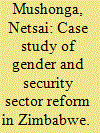

|
|
|
|
|
| Summary/Abstract |
This article explores gender and security sector reform (SSR) in Zimbabwe from 2008 to the present. It firstly postulates that the purpose of gender-sensitive SSR is to transform security services so as to enhance human security, as opposed to having an exclusive focus on state and territorial security. A comprehensive analysis of the policy and legislative framework governing gender and SSR at the global, continental, sub-regional and national levels will be presented, followed by the argument that efforts to reform the partisan and oftentimes non-professional tendencies of the security sector – especially the Zimbabwe Defence Forces, Zimbabwe Republic Police, Central Intelligence Organisation and Zimbabwe Prison Services – to promote democracy have met with firm resistance. However, gender-sensitive SSR has made significant headway in Zimbabwe since it is considered less threatening by the government. It should be noted, nevertheless, that gender-sensitive SSR has the potential to shift levels of professionalism and accountability within the sector as well as change attitudes to enhance security at the personal and communal levels. The process can gradually increase the percentage of women serving in the security sector. In conclusion, recommendations are made to broaden and deepen gender-sensitive SSR as the only viable alternative in the current political environment in Zimbabwe.
|
|
|
|
|
|
|
|
|
|
|
|
|
|
|
|
| 7 |
ID:
089514
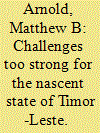

|
|
|
|
|
| Publication |
2009.
|
| Summary/Abstract |
Timor-Leste was badly shaken by a violent national crisis from April 2006 to April 2008. Central to the turmoil were the presence and actions of two groups of ex-soldiers from the Timorese army, known as "petitioners" and "mutineers." This article examines their roles in driving the crisis, by empirically mapping their history, motivations, and relationships
|
|
|
|
|
|
|
|
|
|
|
|
|
|
|
|
| 8 |
ID:
109926
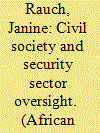

|
|
|
|
|
| Publication |
2011.
|
| Summary/Abstract |
Much is made in the security sector reform literature of the role of civil society as an overseer and monitor of the security sector, contributing to improved accountability and governance. This paper looks at how the notion of 'civil society capacity' needs to be disaggregated in order to develop meaningful strategies to assist civil society organisations to impact security sector reforms in complex, post-conflict contexts like the Democratic Republic of Congo. It draws on fieldwork conducted with 200 Congolese civil society groups that are attempting to engage in current security sector reform processes, and looks at which capacities are required to improve oversight by civil society groups.
|
|
|
|
|
|
|
|
|
|
|
|
|
|
|
|
| 9 |
ID:
132271
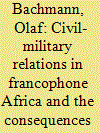

|
|
|
|
|
| Publication |
2014.
|
| Summary/Abstract |
The Building Security Overseas Strategy is at its core an 'Intervention to end all Interventions' - from a Western as well as an African perspective. Two of its main pillars are security sector reform in specific countries and systematic support to the development of the African Peace and Security Architecture. This article addresses the question why such efforts have met little success in francophone Africa. It argues that the failure of Western advisers to understand the sociological dynamics of African armed forces, shaped by a political culture based on personal loyalty to the leader, is at the root of the problem. In that context, the Huntingtonian-type distinction between the civilians and the military does not apply as military and civilians act in concert within common clientelism systems. As a result of the curtailing of the state-formation experience in most African countries, the military never had to demonstrate its performance as a state builder, nor did it have to bargain its legitimacy against the support of the citizens. Partnership in that context will remain a misnomer, at least until African military can credibly demonstrate commitment to state-building grounded in a broad-based social contract.
|
|
|
|
|
|
|
|
|
|
|
|
|
|
|
|
| 10 |
ID:
075025


|
|
|
|
|
| Publication |
2006.
|
| Summary/Abstract |
Private companies play an increasingly important role in security sector reform (SSR). Bilateral donors and multilateral organisations are making use of the services of contractors to conceptualise and implement reforms to institutions that provide public security. The rapid increase in the outsourcing of SSR and the belief that the private sector's role in SSR will continue to expand in the future calls for a dispassionate analysis and debate on the role of the contractors and the benefits and risks outsourcing entails. This article investigates the role of one particular subset of contractors involved in SSR - management consultants - taking as a case study the work of Atos Consulting, subcontracted by the UK Department for International Development, in reforming the Jamaican police.
|
|
|
|
|
|
|
|
|
|
|
|
|
|
|
|
| 11 |
ID:
124492


|
|
|
|
|
| Publication |
2013.
|
| Summary/Abstract |
The Arab Spring, a pro-democracy uprising that has been sweeping through North Africa and the entire Arab world since 2010, has been described as a cataclysmic revolutionary wave that has left the overthrow of political regimes in its wake. Studies have comprehensively x-rayed the political and socio-economic circumstances that gave rise to the uprising. Apart from the impact of the uprising on political developments and democratic governance in the Arab world in particular and the world in general, the circumstances that resulted in the revolutions constitute empirical security implications for Nigeria. This is the focus of this article. Using the Ibrahim Index of African Governance (IIAG) and other selected indicators, this article draws a comparative analysis of the key factors that led to the uprisings in Egypt, Libya and Tunisia, pointing out areas of social and security tensions in Nigeria. Based on these findings, it points out the urgency of and imperative for security sector reforms in Nigeria.
|
|
|
|
|
|
|
|
|
|
|
|
|
|
|
|
| 12 |
ID:
163093
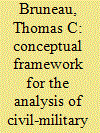

|
|
|
|
|
| Summary/Abstract |
The article argues that current conceptual approaches in civil-military relations are deeply flawed resulting in its irrelevance in analyzing major issues including war and the collapse of democracy. After highlighting major flaws in the work of the late Samuel Huntington and those who follow his approach, the article argues that other conceptual approaches, including Security Sector Reform, are also flawed, or in the case of the “military effectiveness” literature, largely irrelevant. In explaining the main causes of the flawed conceptual literature, the article highlights the absence of good data and challenges in methodology. While arguing that military forces are very unlikely to engage in armed combat, it highlights the roles and missions which in the world today are implanted by these forces. As it is virtually impossible to prove effectiveness of the armed forces in these roles and missions, the article proposes a conceptual approach based on requirements.
|
|
|
|
|
|
|
|
|
|
|
|
|
|
|
|
| 13 |
ID:
068212


|
|
|
| 14 |
ID:
180623
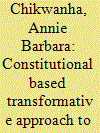

|
|
|
|
|
| Summary/Abstract |
The article reviews contemporaneous security sector reform (SSR) models and proposes an Afrocentric human security oriented alternative, a constitutional based transformative approach. The post-colonial security sector in African countries continues to struggle with converting and infusing the nationalist liberators’ underlying values into the new institutions and this has kept post-independence security provision skewed in favour of the new political elite. Post-liberation war African countries have undergone series of SSR that depicted some semblance of stability during the transition from violent liberation struggles that were mostly fought from exile, yet the possibility of intractable conflict is real. Decades after the retreat of colonialism, the national security apparatus in the region remains a source of both instability and insecurity in many countries. This proposed SSR constitutional based transformative framework is underpinned by three core concepts: participation; accountability and transparency that undergird the core of a participatory anchored security sector governance (SSG) approach. These elements are critical factors for influencing the transformation and decolonising of the post-colonial security sector in Africa into human security focused systems.
|
|
|
|
|
|
|
|
|
|
|
|
|
|
|
|
| 15 |
ID:
154276
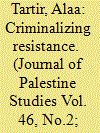

|
|
|
|
|
| Summary/Abstract |
The Palestinian Authority (PA) adopted donor-driven security sector reform (SSR) as the linchpin to its post-2007 state-building project. As SSR proceeded, the occupied West Bank became a securitized space and the theater for PA security campaigns whose ostensible purpose was to establish law and order. This article tackles the consequences of the PA’s security campaigns in Balata and Jenin refugee camps from the people’s perspective through a bottom-up ethnographic methodological approach. These voices from below problematize and examine the security campaigns, illustrating how and why resistance against Israel has been criminalized. The article concludes by arguing that conducting security reform to ensure stability within the context of colonial occupation and without addressing the imbalances of power can only ever have two outcomes: “better” collaboration with the occupying power and a violation of Palestinians’ security and national rights by their own security forces.
|
|
|
|
|
|
|
|
|
|
|
|
|
|
|
|
| 16 |
ID:
068204
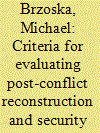

|
|
|
| 17 |
ID:
083092


|
|
|
| 18 |
ID:
119280
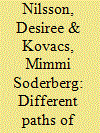

|
|
|
|
|
| Publication |
2013.
|
| Summary/Abstract |
Security Sector Reform (SSR) has developed into a key component of international peacebuilding agendas. However, there is a lack of sufficient knowledge of the advantages and drawbacks of different reform processes. This study offers a comparative analysis of two post-war states with diverse approaches to the reconstruction of the national armed forces after a civil war: Sierra Leone after the 1999 Lomé Peace Accord, where the competing warring parties were integrated into a single force; and Liberia following the 2003 Accra Peace Agreement, where the old army was disbanded and a new force was recruited and built from scratch. The findings show that each approach was associated with distinct benefits and risks during the implementation process. However, the outcomes are also similar in many important respects, and raise questions about the long-term sustainability of these reforms.
|
|
|
|
|
|
|
|
|
|
|
|
|
|
|
|
| 19 |
ID:
075021
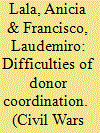

|
|
|
|
|
| Publication |
2006.
|
| Summary/Abstract |
This article is explores UNDP's SSR activities in Mozambique, from the last stages of the post-civil war DDR programme until the beginning of 2005. It focuses primarily on the police force while looking at similar efforts in the judicial sector. It also focuses on how UNDP's strategic planning capacity and programme approaches affected the outcome of reforms sought. Finally, it analyses the constraints of Mozambique's SSR that affected its progress and implementation, including the rationale for embarking on reform and the persistent resistance to change by national institutions.
|
|
|
|
|
|
|
|
|
|
|
|
|
|
|
|
| 20 |
ID:
080305
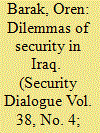

|
|
|
|
|
| Publication |
2007.
|
| Summary/Abstract |
This article suggests that much of the violence that has ravaged Iraq since the country's occupation by the US-led coalition in 2003 can be explained by focusing on the interplay between domestic and external factors that pushed Iraq's major communities (Shi'is, Sunnis, and Kurds) into conflict. The domestic factors include an intercommunal `security dilemma' that was engendered by the US-led invasion; the role of belligerent `ethnic entrepreneurs' within these communities; and the long-term animosities, apprehensions, and fears among their members. External factors include the disbandment of Iraq's ruling elite, regime, and security sector by the USA, along with the role of the Arab and Muslim volunteers who came to fight Iraq's foreign occupation. The article concludes by discussing the possible ramifications of the conflict in Iraq for domestic, regional, and international security, and mentions several steps that can help ameliorate it.
|
|
|
|
|
|
|
|
|
|
|
|
|
|
|
|
|
|
|
|
|